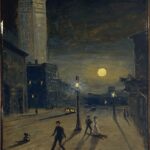“‘Living As Humans in A Machine Age’: Reflections on this Year’s Front Porch Republic Conference.” Dixie Dillon Lane reflects on last week’s conference and puts her finger on what unites the motley group of people who gather here on the porch: “they all seem to share a love of publicly teasing each other, without prejudice and without any hint of mercy. Now, I wondered at this at first. I understood, of course, that it likely meant that they really cherished each other; this sort of teasing is a clear sign of affection and belonging. But what I didn’t understand is that the people who attend FPR conferences can tease and be teased publicly with no ill effects for one unusual reason in particular: because at this conference they can speak freely, and they aren’t afraid of others speaking freely, either.”
“New Worlds to Build.” Chris Smaje responds with clarity and goodwill to George Monbiot’s sneering dismissals of his defense of local agriculture: “There’s real work of transformative adaptation to do to rise to present challenges – unsung, grassroots and local. It’s time to forget fantasy narratives like Regenesis, and to forget conspiracy-tinged theories about shadowy environmentalist movements with formulas for mass death. It’s time to get on with building new local worlds.”
“Decentralism File.” John McClaughry has done a great public service by compiling and editing a wide range of primary writings about decentralism: “For over 25 centuries, the idea of a peaceful human-scale, ecologically respectful society has persisted in the face of a long train of conquerors, monarchs, god-kings, despots, war lords, and other authoritarians committed to the consolidation of many or all of the functions of human communities under their centralized management and control. Unfortunately, much of this history has been written about the centralizers, while the more humane voices of the decentralists have been ignored or lost. The purpose of the Decentralism File is to bring to the modern reader a selection from the writings of advocates in the decentralist tradition, beginning in Lao-Tzu’s China of 550 BC, and continuing through a wide range of cultures and eras into the present day.”
“Two Cities: The Public and the Private.” Igor Damous reflects on Dickens’s wise reminder that proper sentiments attach to particular, embodied people and places and that dangerous ones seize on abstract categories. Perhaps the titular two cities exist in parallel in every city: “The existence of two parallel cities in each and every city; one of them easily perceived, a city constructed for appearances, that sees social cohesion as a result of norms or necessities, and that pursues the planning of souls through neutrality and equality; the other, a phantom, mysterious and borderless city, composed by unique souls and its secrets, where cohesion, if it exists or not, is made through affection and sympathy. That is, a fictional and public city and a real city of privacies. One to be seen; the other to be touched.”
“The Decision to Move Home.” Kathleen M. Jacobs describes wrestling with her decision to move back to rural West Virginia: “Certainly the people I know in the area — have known for many years — play a vital role in my consideration to return, but in the end it is not so much about them as it is about how I might find a way to bring something of value to the table. Because unless I can identify that crucial element, I would only be in the way; and if you know anything about rural Americans, you know there’s little appetite for that.”
“Byung-Chul Han, the Philosopher who Lives Life Backwards: ‘We Believe We’re Free, but We’re the Sexual Organs of Capital.’” Joseba Elola visits the Korean-German philosopher in Berlin and talks with him about his ideas and life. Han, who says that he feels “like a reincarnation of Simone Weil,” confesses, “I live my life backwards. When people leave the Church, I enter.”
“Why Are Rural Kids More Upwardly Mobile?” Robert VerBruggen reports on a study that finds children in rural areas end up making more money than their urban peers: “Where does that effect come from? The explanation that best fits the data is that upward mobility is stronger in places with more two-parent families—something that Chetty’s work itself showed—and two-parent families in turn are more common in rural areas.”
“Review: Kayaking with Lambs.” Eliza Daley reviews the latest from FPR Books: “Kayaking with Lambs will surely find a permanent home on the nightstand, with those elect books that can’t be put away, that should always be at hand. When the world is closing in, these are the stories that we will reach for in order to bring things back into perspective. ‘Farming is not a career. It is not a lifestyle. It is life.’”
“Sheep – Part 1.” Patrick Laurie meditates on his grandfather’s life and character and the influence he’s had on how Laurie imagines farming today: “In later life, my grandfather advanced into cattle and excelled with his galloways. They must have offered an exciting degree of danger, but sheep ran through him like sap through a tree until the day he died. And in him, my life and our landscape was crystallised as a clear expression of character, temperament and resilience.” (Recommended by Brian Miller.)
“An E-bike is Not an Expensive Bike. It’s a Cheap Car.” Michael J. Coren explains why e-bikes are becoming popular and how people are using them: “For years, e-bikes languished in the United States even as they exploded in popularity in Asia and Europe. Then the pandemic hit. E-bike sales in the United States surged 269 percent between 2019 and 2022, approaching $1 billion, even as overall bike sales declined, reports market research firm Circana. In the United States, e-bikes now outsell electric cars and trucks.”
“The Cemeteries of New York State.” Bill Kauffman is in favor of visiting dead writers, particularly from his natal state: “Prose may be deathless, but authors are not — and some of us honor those who compose with visits to where they decompose. I’m afraid that I am one such pilgrim: heck, my wife left her bridal bouquet at the grave of Jack Kerouac in Edson Cemetery in Lowell, Massachusetts. The epitaph for ‘Ti Jean’ is ‘He Honored Life’; so, paradoxically, do those who make sepulchral sorties.”
“Resisting the ‘Machine’: An Interview with Peco Gaskovski.” Jonathon Van Maren interviews Peco Gaskovski about his recent novel Exogenesis (which has a 20% discount until the end of the month with the code “EXOGENESIS”) and his writing and technology habits: “personal discipline isn’t enough to manage tech in the family anymore. Our emerging solutions are focusing, instead, on regulating not just ourselves, but our physical environment. For instance, laptops can’t just lie around anywhere and be used anytime, but are restricted to certain times, and then must be returned to their storage places. We’re far from perfect in this, but I think this approach—a temporal and structural order that thwarts ‘Machine’ structures in the home—is more effective than expecting individuals to resist with willpower.”






